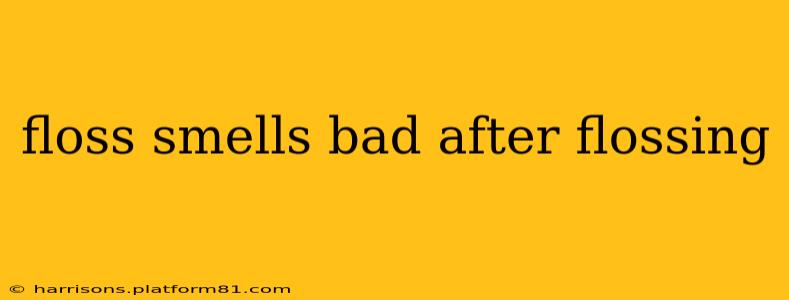Many people diligently floss their teeth, only to be met with an unpleasant surprise: a foul odor emanating from the floss itself. This isn't necessarily a sign of poor oral hygiene, though it certainly warrants attention. The smell can stem from various sources, and understanding these causes is the first step towards fresher breath and a healthier mouth.
What Causes Bad-Smelling Floss?
The unpleasant smell you experience after flossing is often linked to the buildup of bacteria and food particles trapped between your teeth. This debris, unseen to the naked eye, harbors microorganisms that produce volatile sulfur compounds (VSCs), the primary culprits behind bad breath. When you floss, you're essentially dislodging these bacteria and their byproducts, resulting in a temporary, but sometimes pungent, smell.
Is It Normal for Floss to Smell Bad After Flossing?
To some extent, yes. A slight, temporary odor is relatively common, especially if you haven't flossed regularly or if you consume foods that tend to linger between teeth. However, a consistently strong or persistent foul odor could indicate a more serious oral health issue.
What Does Bad-Smelling Floss Indicate?
A strong, persistent odor from your floss could signal several problems:
-
Gum Disease (Gingivitis or Periodontitis): Infected gums release bacteria and inflammatory substances, contributing to a foul smell. Gingivitis is the early stage of gum disease, characterized by redness, swelling, and bleeding gums. Periodontitis is a more advanced stage, involving bone loss and potential tooth loss.
-
Decayed Teeth: Cavities can harbor bacteria that produce VSCs, leading to a noticeable odor on the floss.
-
Poor Oral Hygiene: Insufficient brushing and flossing allow plaque and bacteria to accumulate, resulting in a strong smell.
-
Dry Mouth (Xerostomia): A lack of saliva reduces the mouth's natural cleansing ability, leading to bacterial growth and odor.
-
Food Impaction: Food particles lodged between teeth can decay and contribute to the unpleasant smell.
How Can I Prevent My Floss From Smelling Bad?
Prevention is key to avoiding bad-smelling floss. Here are some essential steps:
-
Floss Regularly: Make flossing a daily habit. The American Dental Association recommends flossing at least once a day.
-
Brush Thoroughly: Brushing twice a day with fluoride toothpaste helps remove plaque and food particles, reducing bacterial buildup.
-
Use an Antibacterial Mouthwash: Rinsing with an antibacterial mouthwash can help control bacteria and freshen breath.
-
Maintain a Healthy Diet: Avoid excessive consumption of sugary and acidic foods and drinks, as these contribute to bacterial growth.
-
Stay Hydrated: Drinking plenty of water helps rinse away food particles and stimulates saliva production.
-
See Your Dentist Regularly: Regular dental checkups and cleanings are crucial for maintaining optimal oral health and preventing problems that can lead to bad-smelling floss.
Why Does My Floss Smell Even After Brushing and Flossing?
Even with diligent brushing and flossing, a lingering odor might persist due to deeper pockets of bacteria under the gum line, indicative of gum disease. This requires professional dental intervention.
How Often Should I Floss?
The general recommendation is to floss at least once a day, ideally before brushing.
What Should I Do If My Floss Continuously Smells Bad?
If you consistently experience a foul odor from your floss, even after improving your oral hygiene, it's crucial to schedule an appointment with your dentist or periodontist for a thorough examination and diagnosis. They can assess your oral health, identify any underlying issues, and recommend appropriate treatment. Don't ignore persistent bad breath—it could signal a serious problem requiring professional care.
